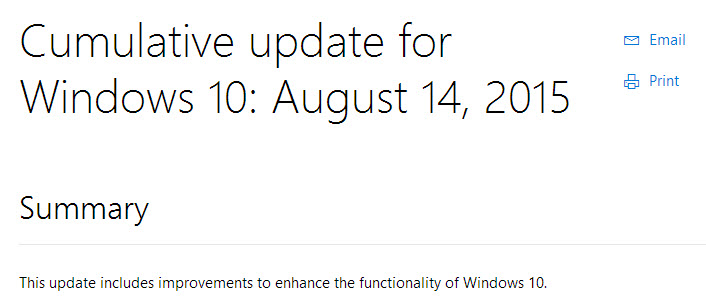Microsoft has a communications problem
When Microsoft announced that Windows 10 would be freely available for a year, one focus of the discussion that ensued afterwards concentrated on the company's attempt to lure users with the free offer to introduce subscriptions later on.
The whole drama could have been avoided with a simple clarification but it took Microsoft months to get a statement out that clarified the issue. Up to this day, comments are being made that Windows 10 is not really free and that users will have to pay for the operating system after the first year.
The next big thing that blew up in Microsoft's face was a revised end user license agreement (EULA). In it, Microsoft reserved the right to block counterfeit games and disable unauthorized hardware.
The EULA went viral and many sites reported that Microsoft had added a killswitch to Windows 10 that allowed the company to block pirated games on systems running the operating system.
It is still widely debated if that is the case and whether Microsoft will make use of it. The company could put an end to this easily by issuing a simple statement that clarifies the issue.
The third PR nightmare is just around the corner. Microsoft released the third cumulative update for Windows 10 recently. Unlike before, it did not reveal what changed in it but used the ambiguous "This update includes improvements to enhance the functionality of Windows 10" instead.

The Register wanted to know more about it and received word from Microsoft that it won't post relevant KB articles for all updates that it delivers with Windows as a service.
It is a tough nut to swallow for privacy or security conscious users as well as business customers, especially when you consider that updates may break systems and Windows 10's incredible hunger for telemetry data.
The change will be reported widely and it is likely that at least some reports will criticize Microsoft heavily for it.
Better communication
Microsoft should have realized by now that everything it says, or not says, will be analyzed in detail. Some users will pick the most negative interpretation and run with it while others may be confused instead.
The effect of being tight-lipped is that negative comments spread even if they are not true. While Microsoft may not see this as overly dramatic or problematic, it does paint the company in a bad light.
While some criticism is certainly justified, part of it could have been avoided easily by the company.
Microsoft is not the only company that could do better PR-wise. Mozilla for instance falls into the trap occasionally as well.
This article was first seen on ComTek's "TekBits" Technology News

- Log in to post comments